

Addressing the privacy paradox: Top leaders and experts share insights. As technological innovation evolves, society evolves with it.
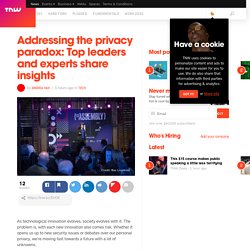
The problem is, with each new innovation also comes risk. Whether it opens us up to new security issues or debates over our personal privacy, we’re moving fast towards a future with a lot of unknowns. During TNW Conference 2019 top government officials, business and technology leaders and everyday technology users like you and me came together at The Assembly to discuss the growing privacy paradox. Quick Tip: How To Delete Your Data From Google's Servers. You can remove some of your data from Google's servers.
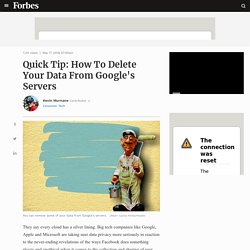
Credit: Alexas Fotos/Pixabay They say every cloud has a silver lining. Big tech companies like Google, Apple and Microsoft are taking user data privacy more seriously in reaction to the never-ending revelations of the ways Facebook does something sleazy and unethical when it comes to the collection and sharing of user data. The GDPR regulations adopted by the EU have also played an important role. Information about you is being collected all the time if you go online, carry a cell phone or do anything else that involves interacting with the digital world. Google has made a serious commitment to giving users more insight and control over what it does with the data it collects. Protecting your online privacy is tough—but here's a start. Your online profile is less a reflection of you than a caricature. Whether you like it or not, commercial and public actors tend to trust the string of 1s and 0s that represent you more than the story you tell them.
When filing a credit application at a bank or being recruited for a job, your social network, credit-card history, and postal address can be viewed as immutable facts more credible than your opinion. But your online profile is not always built on facts. It is shaped by technology companies and advertisers who make key decisions based on their interpretation of seemingly benign data points: what movies you choose to watch, the time of day you tweet, or how long you take to click on a cat video. The Best VPN Services: Tested and Benchmarked. Deseat.me. How to Download Your Facebook Data and What to Look for in It. Everything You Need to Know About the CLOUD Act.
While you were reeling from the Facebook and Cambridge Analytica scandal, the U.S. government quietly passed a piece of legislation that has far bigger implications for your data.
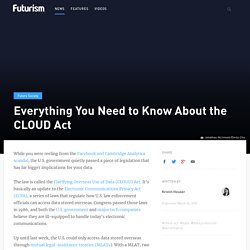
Up until last week, the U.S. could only access data stored overseas through mutual legal-assistance treaties (MLATs). With a MLAT, two or more nations put in writing exactly how they are willing to help each other with legal investigations. The Senate votes on each MLAT, and it must receive a two-thirds approval to pass. The CLOUD Act gives the U.S. an alternative to MLATs. Through the CLOUD Act, U.S. law enforcement officials at any level, from local police to federal agents, can force tech companies to turn over user data regardless of where the company stores the data. Politicians introduced the CLOUD Act to the Senate and House of Representatives on February 6. But guess what? Privacy. Leaked NSA Tool 'Territorial Dispute' Reveals the Agency's List of Enemy Hackers. NOTHING TO HIDE (Full movie, French) Polisis. Inter-ligere - Simulons comment Youtube peut analyser votre personnalité. Dans le cadre de ce billet je vais analyser un aspect du monde numérique actuel : Celui de la transparence (de la nudité devrait-on dire) de l’internaute vis-à-vis des outils qu’il utilise.
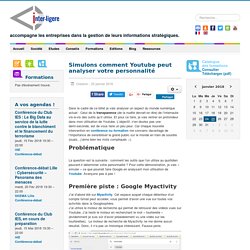
Et pour ce faire, je vais rentrer en profondeur dans mon utilisation de Youtube. L’objectif, n’en doutez pas une demi-seconde, est de vous faire un peu peur. Car chaque nouvelle intervention en conférence ou formation me convainc davantage de l’importance de sensibiliser le grand public sur le monde en train de sourdre (ouais…j’aime bien les mots compliqués ;-). Problématique La question est la suivante : comment les outils que l’on utilise au quotidien peuvent-il déterminer votre personnalité ? Famed Hacker Kevin Mitnick Shows You How to Go Invisible Online.
If you’re like me, one of the first things you do in the morning is check your email.
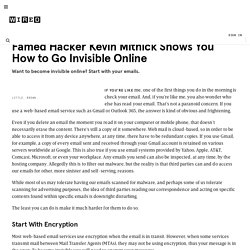
And, if you’re like me, you also wonder who else has read your email. That’s not a paranoid concern. If you use a web-based email service such as Gmail or Outlook 365, the answer is kind of obvious and frightening. Even if you delete an email the moment you read it on your computer or mobile phone, that doesn’t necessarily erase the content. There’s still a copy of it somewhere. While most of us may tolerate having our emails scanned for malware, and perhaps some of us tolerate scanning for advertising purposes, the idea of third parties reading our correspondence and acting on specific contents found within specific emails is downright disturbing.
The least you can do is make it much harder for them to do so. Start With Encryption Most web-based email services use encryption when the email is in transit. The Grand Tor: How to Go Anonymous Online.